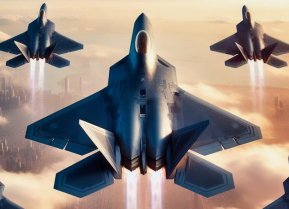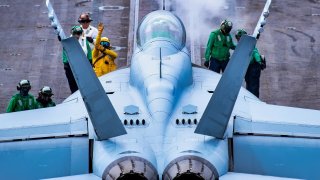The U.S. Navy Wants to 'Extend' Nimitz-Class Aircraft Carriers
The U.S. Navy's iconic Nimitz-class aircraft carriers, in service since 1975, are set to be extended due to rising global tensions and delays in the Ford-class replacement program.
Summary and Key Points: The U.S. Navy's iconic Nimitz-class aircraft carriers, in service since 1975, are set to be extended due to rising global tensions and delays in the Ford-class replacement program.
-Vice Adm. Kenneth Whitesell confirmed plans to extend the lifespan of these carriers, given their crucial role in naval operations and the current strain on fleet resources.
-While the Ford-class carriers promise advanced capabilities like reduced crew requirements and an electromagnetic catapult system, production delays and budget overruns have slowed their deployment. Consequently, the Navy will continue to rely on the proven Nimitz-class carriers until the Ford-class is fully operational.
Why the U.S. Navy is Extending the Lifespan of Its Nimitz-Class Carriers
At some point, the iconic fleet of Nimitz-class aircraft carriers will be phased out of the U.S. Navy’s inventory. But it will be a while before the class at large. The lead ship debuted in 1975, but the Navy has plans to extend the venerable warships.
Extending the Nimitz
Despite being almost 50 years old, Nimitz-class vessels are still in high demand. As incidents flare in the Middle East and tensions rise in the Indo-Pacific, some pundits suggest the U.S. does not have enough aircraft carriers. I would argue that 11 supercarriers, by far the world’s largest inventory, is sufficient, but regardless, it seems unlikely the U.S. would enter a drawdown period when existing carriers are already overtaxed.
“Extending Nimitz, extending Ike, it’s going to happen for every Nimitz-class carrier. At least one extension,” said Vice Adm. Kenneth Whitesell in 2023, as reported by Aviation Week.
Geopolitical tensions are one reason the Nimitz class is likely to be extended. Delays to the upcoming Ford class is another. To avoid reductions in overall fleet quantity, the Navy will need to keep Nimitz vessels in service at least until replacements are available for deployment. But the Nimitz’s replacement, the Ford, has faced production issues. So while the $120-billion-plus Ford program is being sorted, the Navy will invest in Nimitz extensions.
“Carriers are the linchpin of everything we do in naval aviation,” said Rear Adm. Michael Donnelly, Aviation Week reported. “Our requirements are designed and aligned within our air wings to provide the capability out to the [combatant commands] for our ability to conduct the mission. Our ability to get the carriers out on time, whether it is new procurement or maintenance, is essential.”
Replacing the Nimitz
The Ford is a heralded vessel. But like many weapons projects that introduce new technology, the class has been slow to get off the ground. Its lead ship, USS Gerald R. Ford, was delayed and over budget, deploying some 15 years after being named. The ship was supposed to cost $10.5 billion but ended up costing $13.3 billion. And while the Ford is quite advanced in several respects, the ship is not yet capable of hosting the F-35C. Understandably, the Navy has reservations about replacing the tried-and-true Nimitz with a glitchy Ford.

On paper, the Ford is a revolutionary design. It is built around automated features that should reduce crew requirements and decrease costs over the lifetime of the ship. The Ford was designed to offer a higher Sortie Generation Rate than the Nimitz as a result of the EMALS electromagnetic catapult system – a theoretical upgrade over the steam-powered catapult found on the Nimitz. While the EMALS hasn’t worked perfectly, the concept should be easier and cheaper to operate once it is refined.
In the meantime, the Navy will no doubt continue relying upon their proven Nimitz-class carriers.
About the Author: Harrison Kass
Harrison Kass is a defense and national security writer with over 1,000 total pieces on issues involving global affairs. An attorney, pilot, guitarist, and minor pro hockey player, Harrison joined the US Air Force as a Pilot Trainee but was medically discharged. Harrison holds a BA from Lake Forest College, a JD from the University of Oregon, and an MA from New York University. Harrison listens to Dokken.


